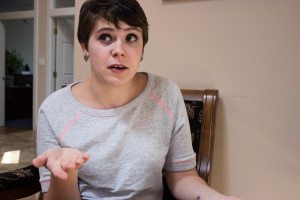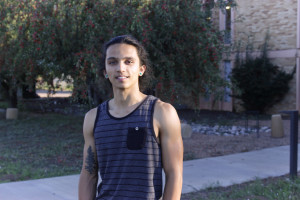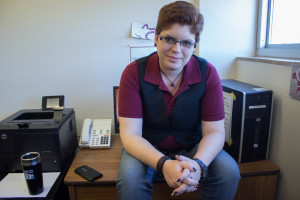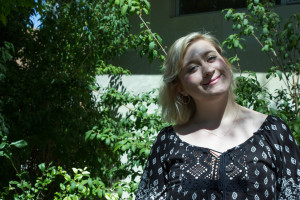Tags
Related Posts
Share This
The Political Experience
With the presidential election right around the corner, Santa Fe University of Art and Design is pulsing with politically charged energy. But according to voter studies, nearly twice as many adults over the age of 60 participate in presidential elections as adults under the age of 30. During Congressional elections, the voting population under the age of 30 is nearly nonexistent, despite being an opinionated and outspoken generation. Jackalope Magazine got in touch with several SFUAD students to ask the question: What is your political experience?
Brianna Neumann, a Creative Writing and Literature student in her junior year, explained that politics didn’t feel important to her until her seventeenth birthday, when she realized that she was gay.

Brianna Neumann talks passionately about her coming into politics. Photo by Amaya Hoke
BN: Before I realized that I was gay or that women were treated differently in our society, I didn’t understand why I would need politics. I didn’t understand the point of voting or representation. It didn’t occur to me that my rights could be at stake. I guess I always knew that politics were there, but knowing what they could do for me came after [these realizations].
Millennials or Generation Y, came into adulthood during a cornucopia of political change. A combination of post 9/11 American patriotism, widespread social media coverage of previously ignored injustices and the nationwide legalization of equal marriage has produced a generation famous for its political correctness and rapid-fire outrage at global inequity.
BN: I remember when same sex marriage became nationwide; I remember feeling like that was a modern version of the Civil Rights Act. It’s a big change that allows a group of people to fit more into a culture. I think I have a connection to [those who have fought for their rights in the 20th century]. I know what it’s like to see change happen. I think about [the future] all the time. The older a person you talk to, the less they [seem to understand]. I hope that I will be able to look back on this experience of being a 20-year-old lesbian and be able to acknowledge that whoever the next generation is that doesn’t feel accepted, that they are valid.

Richard Sweeting believes in making political involvement more accessible. Photo by Amaya
Jackalope Magazine also spoke with Richard Sweeting, a junior Photography major.
RS: [Politics determine the trajectory of our generation], but I don’t think we are very involved in politics…Most of us are busy trying to pursue our careers. Voting requires a lot of research and preparation that many young adults don’t [have the time for]. I’m straight and white in America…life can’t really get much smoother for me, but I think it’s hypocritical that we [call ourselves] the ‘Land of the Free.’ I think we can improve [voter turnout] with good journalism…easier ways to vote and more information on how. I honestly didn’t even know where to vote in the primaries. Why hasn’t voting gone digital?
For Jen Hanson, a senior in Creative Writing, living in New Mexico is a constant reminder of how local politics directly affect each individual.

Jen Hanson wants to change the mental health care situation in New Mexico. Photo by Amaya Hoke
JH: When I was under my parents’ insurance, which was pretty much my whole life, I was able to [access] healthcare whenever I needed it. But then I went independent, and I haven’t had consistent insurance [in years]. It’s great that I can get insurance through the government…but it’s hard to hold on to. I have a friend who needed mental health care in New Mexico and, just to get an evaluation, [the friend] had to go into a clinic at 6 a.m., and wait in a line, and hope that they could get seen. People who are seeking help get turned away every day. Of all the funds to cut, you should not cut mental health. It affects our society when people aren’t getting help.
Jackalope Magazine also spoke with Marjorie Solo, a senior CWL student, about her experience in getting a foot in the door of the political world.
MS: As a queer woman, politics became very important to me early on in life in order to secure my opportunities and equality. [Being a part of] two marginalized groups while still having the privilege of being white has shaped my scope in politics. I find that intersectionality is what’s important now because I am fighting two battles at the same time while some people are fighting more. There are laws being enacted to benefit marginalized groups but I believe that we have not been involved in creating those policies, and so they often fall short of meeting our needs. Sometimes I think that politics are closed off to younger generations because of a lack of term limits and forward motion to involve younger generations. But also, our generation needs to recognise the big picture. We are plugged in [globally] but we neglect our immediate surroundings. Change starts in your living room. You have to turn to your roommate and you have to talk about it.
For each young adult, the political experience is different, and going forward there is no doubt that it will continue to change.

Marjorie Solo wants to become more politically involved in her community. Photo by Amaya Hoke






 Jackalope Magazine is the student magazine of Santa Fe University of Art and Design. Building on the interdisciplinary nature of our education, we aim to showcase the talent of our university and character of our city.
Jackalope Magazine is the student magazine of Santa Fe University of Art and Design. Building on the interdisciplinary nature of our education, we aim to showcase the talent of our university and character of our city.
Recent Comments